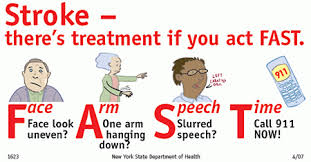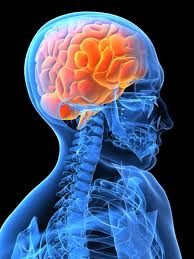4 Warning Signs That Someone is Having a Stroke
What are the stroke warning signs?
If it came right down to it, would you know the 4 warning signs that someone is having a stroke? Stroke is something you hear a lot about, but it can be difficult to recognize. Even the person having the stroke is not always aware that that is what’s happening.

If you suspect that someone is having a stroke, the National Stroke Association promotes a quick and easy way to test for stroke. They call this “Act F.A.S.T.”
4 Warning Signs That Someone is Having a Stroke
- Face – Ask the person to smile. Does one side of the face droop?
- Arms – Ask the person to raise both arms. Does one arm drift downward?
- Speech – Ask the person to repeat a simple sentence. Are the words slurred? Can he/she repeat the sentence correctly?
- Tongue -Ask the person to stick out there tongue. Does the tongue bend toward on side?
If the person has difficulty with these 4 warning signs, time is very important. Call 9-1-1 or get to the hospital fast. Brain cells are dying.
The best approach: Learn to recognize all of the signs of stroke:
- Sudden numbness or weakness of the face, arm or leg, especially on one side of the body
- Sudden confusion, trouble speaking or understanding
- Sudden trouble seeing in one or both eyes
- Sudden trouble walking, dizziness, loss of balance or coordination
- Sudden, severe headache with no known cause
What is a stroke?
A stroke happens when blood flow to a part of the brain stops. A stroke is sometimes called a “brain attack.” If blood flow is stopped for longer than a few seconds, the brain cannot get blood and oxygen. Brain cells can die, causing permanent damage.
What are the risk factors for stroke?
- High blood pressure is the main risk factor for strokes
- atrial fibrillation
- Diabetes
- Family history of stroke
- High cholesterol
- Increasing age, especially after age 55
- Race (black people are more likely to die of a stroke)
- People who have heart disease or poor blood flow in their legs caused by narrowed arteries
- People who have unhealthy lifestyle habits such as smoking, high fat diet, and lack of exercise
- Women who take birth control pills (especially those who smoke and are older than 35)
What are the Symptoms of Stroke?
The symptoms of stroke depend on what part of the brain is damaged. As I mentioned earlier, sometimes the person having the stroke may not even be aware of what is happening. Most of the time, symptoms develop suddenly and without warning. However, sometimes the symptoms may occur on and off for the first day or two. Symptoms are usually most severe when the stroke first happens, but they may slowly get worse.
A headache may occur if the stroke is caused by bleeding in the brain. The headache:
- Starts suddenly and may be severe
- Occurs when you are lying flat
- Wakes you up from sleep
- Gets worse when you change positions or when you bend, strain, or cough.
Other symptoms depend on how severe the stroke is and what part of the brain is affected. Here is a list of other stroke warning signs to look for:
- Change in alertness (including sleepiness, unconsciousness, and coma)
- Changes in hearing
- Changes in taste
- Changes that affect touch and the ability to feel pain, pressure, or different temperatures
- Clumsiness
- Confusion or loss of memory
- Difficulty swallowing
- Difficulty writing or reading
- Dizziness or abnormal feeling of movement (vertigo)
- Lack of control over the bladder or bowels
- Loss of balance
- Loss of coordination
- Muscle weakness in the face, arm, or leg (usually just on one side)
- Numbness or tingling on one side of the body
- Personality, mood, or emotional changes
- Problems with eyesight, including decreased vision, double vision, or total loss of vision
- Trouble speaking or understanding others who are speaking
- Trouble walking
What to do if you think someone is having a stroke:
Get them to a doctor as soon as possible! A stroke is a medical emergency. Quick treatment is needed. Call 911 or your local emergency number or seek urgent medical care at the first signs of a stroke.
People who are having stroke symptoms need to get to a hospital as quickly as possible. If the stroke is caused by a blood clot, a clot-busting drug may be given to dissolve the clot. This treatment must be started within 3 to 4 1/2 hours of when the symptoms first started to be effective.
The doctor will do a physical exam to check for problems with vision, movement, feeling, reflexes, understanding, and speaking. The doctor and nurses will repeat this exam over time to see if the person’s stroke is getting worse or improving.
They will also listen for an abnormal sound, called a “bruit,” when using a stethoscope to listen to the carotid arteries in the neck. A bruit is caused by abnormal blood flow, and they will check for high blood pressure.
Other tests the doctor might perform are:
- Angiogram of the head to look for a blood vessel that is blocked or bleeding
- Carotid duplex (ultrasound) to see if the carotid arteries in your neck have narrowed
- Echocardiogram to see if the stroke could have been caused by a blood clot from the heart
- Magnetic resonance angiography (MRA) or CT angiography to check for abnormal blood vessels in the brain
- Blood tests
- Electrocardiogram (ECG) and heart rhythm monitoring.
Treatment for Stroke:
Other treatments given in the hospital will depend on the cause of the stroke. These may include blood thinners, or medicine to control symptoms such as high blood pressure. Special procedures or surgery to relieve symptoms or prevent more strokes may be required. The patient will receive nutrients and fluids, and may even need a feeding tube in the stomach (gastrostomy tube).
Physical therapy, occupational therapy, speech therapy, and swallowing therapy will all begin in the hospital if this is necessary.
The goal of treatment after a stroke is to help you recover as much function as possible and prevent future strokes.
Recovery from the stroke will begin while still in the hospital or at a rehabilitation center. It will continue when they go home from the hospital or center.
4 Warning Signs That Someone is Having a Stroke
- Face – Ask the person to smile. Does one side of the face droop?
- Arms – Ask the person to raise both arms. Does one arm drift downward?
- Speech – Ask the person to repeat a simple sentence. Are the words slurred? Can he/she repeat the sentence correctly?
- Tongue -Ask the person to stick out there tongue. Does the tongue bend toward on side?

~~
(It’s just sexy!)
~~~
As always, thank you for taking the time to visit my blog.

![]()
♥ Peace ♥
*
Disclosure: Animal Bliss is a Natural Wonder Pets affiliate and will earn a (very small) commission from purchases made through links on this website.
(Coffee money – thank you!)
😀
- Mindful Travel With Your Dog This Holiday Season - December 23, 2019
- A-Z of Australia’s Endangered Wildlife - December 20, 2019
- Teaching Your Kids How to Walk the Dog Safely - December 2, 2019


I think there is more info on strokes in your article then any where else I have ever seen, WOW! Good stuff to know. I sure don’t want a stroke, never ever. My uncle had one and it was the worst! Thanks for the wake up call Jeannie.
This is a great article because it teaches us that we must get to a hospital immediately when a stroke happens.
Lawrence Bergfeld
Stroke is very dangerous among diseases and having some knowledge about its early symptoms is highly helpful in acting fast. Informative post and thanks for visiting my blog !
Stroke is a very serious conditions and thank you for pointing out these signs to us. I would not have known. Its important that people do know and if they do see anyone they can take action.